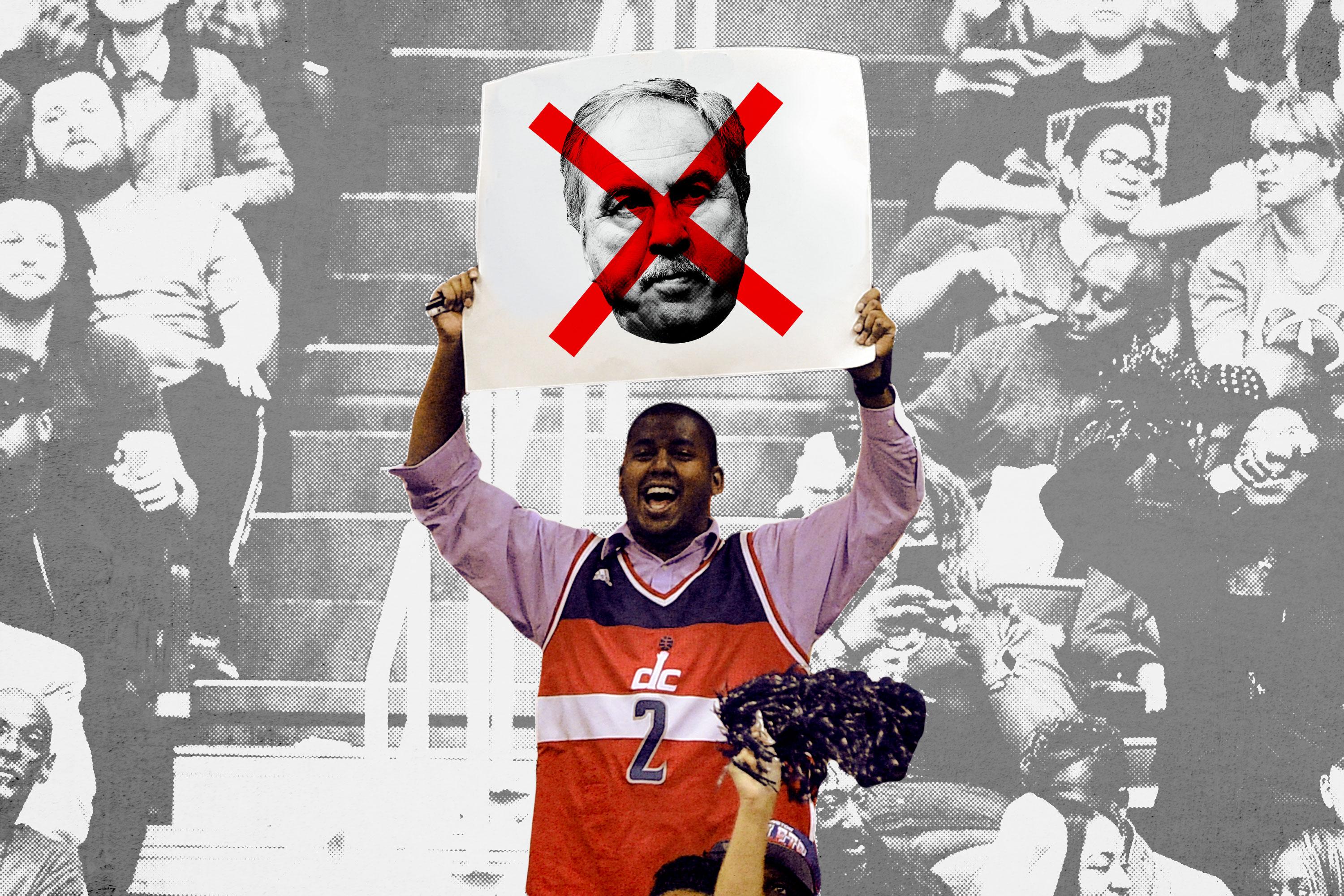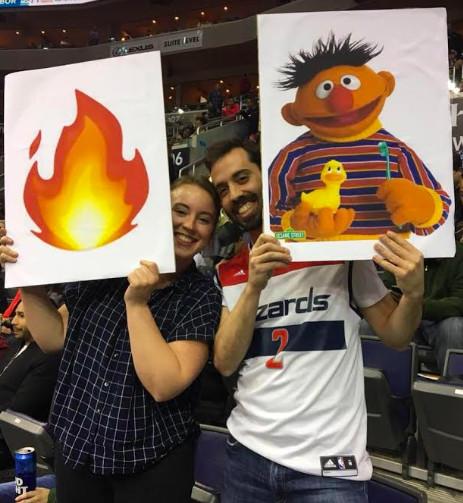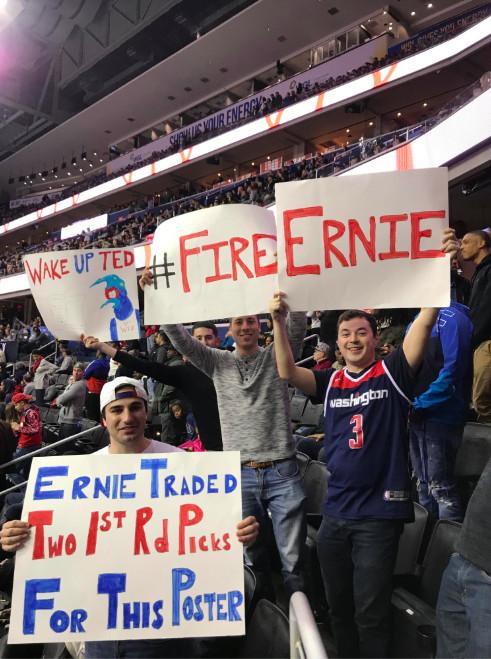
The moment Sunday Umoh realized that Ernie Grunfeld had been fired, and that the Facebook article his friend sent wasn’t a hoax or an April Fools’ joke, he called his wife. Umoh broke the news to her: Grunfeld, the Washington Wizards president for the past 16 years, had finally been let go. She let out a muffled scream—she was at work, otherwise it would have been full-blown—knowing one of her husband’s life passions was over.
Umoh, a software engineer who grew up in D.C. and is currently living in Baltimore, created the website www.fireerniegrunfeld.com in 2012 after the Wizards began the season 0-12. He’s since posted 38 times. Each and every article is either a polemic against the team president or a plea to the Wizards owner, Ted Leonsis, to give him the boot. “FIRE ERNIE GRUNFELD,” the site’s banner reads atop a picture of Grunfeld smiling. Written above: “FINISH HIM FINISH HIM FINISH HIM,” and below: “Stop smiling you smug bastard.” There are articles by Umoh comparing Grunfeld to Billy McFarland, the convicted fraudster who founded Frye Festival. There are multiple listicles of every mistake Grunfeld made during his tenure. One post from May is titled, “I’m Back … Unfortunately,” which contains this passage:
When I say this site is depressing I mean THIS SITE IS DEPRESSING! I stay away from it as much as I can but it is calling me back in. I will update Ernie’s Horrifically Bad Decisions this weekend. It must be done. For history purposes. One day 100 years from now this will be turned into a scary story told around a campfire in the abandon [sic] area in Chinatown where Capital One Arena once laid. For the district[.]
Umoh had taken a couple-year hiatus from the site before deciding to return—the discovery in May 2018 that Wizards owner Ted Leonsis secretly extended Grunfeld again forced his hand. Umoh felt he had no choice but to stay woke, even if it meant not staying sane. Self-care is important. Being a Wizards fan is a self-detriment.
“I’m a nice guy, OK?” Umoh said. “And I don’t hope for people to get fired, even though I made a website that’s called fireerniegrunfeld dot com. I’m a nice guy. I’m just being really honest.”
The chances that Leonsis would see the site were slim, but that wasn’t entirely the point. Umoh did it for the fans and with the hope that local media would bring awareness. (In 2014, Bleacher Report’s Howard Beck picked up the story.) But the end goal was to reach Leonsis. Lifelong fan Mark Strom told me he created a “Fire Ernie” Change.org campaign—one of nine that I found on Google alone in the first five minutes of looking (and not including other campaign sites like ThePetitionSite)—in 2016 because “it just felt urgent.”
It speaks to the sorry state of Wizards basketball that “Fire Ernie” is Washington’s “Roll Tide.” As far back as 2009, “Fire Ernie” shirts were printed and sent to the sports section of The Washington Post. The hashtag #FireErnie is an online rallying cry. Danny Rouhier, a host on 106.7 The Fan, told listeners in December that he was “out” until Grunfeld was fired. “They don’t deserve our attention,” he wrote on Twitter. Last July, a group of young men made a YouTube video announcing they’d stage a “peaceful protest” to get Leonsis’s attention, and in December, a protest was held. (It’s unclear if this was the protest the YouTubers had announced months earlier, or one put on by separate dissenters.) The video starts with a John F. Kennedy quote and ends with “This is a movement that’s far bigger than ourselves” as Enya’s “Only Time” plays in the background.
Strom, who now lives in Minneapolis, took a “Fire Ernie” sign to a game in 2016 in the hope that Leonsis would notice. After all, he had once before. Earlier that season, Leonsis had approached two other sign-holders and essentially told them to grow up. (He then returned from halftime with a cookie—a mocking “thank you.”)
“There’s obviously like a fantasy that Ted will come over, and he’ll have some conversation where you’re like, ‘What about this? He’s done all these things wrong,’” Strom said. He bought good seats. He was ready to fight the good fight. Maybe it’d be him to reach Leonsis. “But you know, those were more fantasies. I didn’t really think I was starting a movement, but I wanted to contribute to it.”

In December, I visited Capital One Arena for Washington’s game against Charlotte. Two seasons after that first sign, there were still multiple “Fire Ernie” posters and “Fire Ernie” chants. One was even started during a dead ball with 1.5 seconds left in the game and the Wizards up one point, which is when most fans would scream things like “Let’s go Wizards.” Yelling “Fire Ernie” was the most passionate rally cry all night. “The crowd is dead,” said Ben Winston, a 28-year-old political consultant living in D.C., who made one of the first “Fire Ernie” signs. “The players look like they don’t want to be there. And the PA announcer is like, ‘The best fans in the NBA!’ and it’s just silent. It’s really sad.”

Grunfeld ran the show for 16 years. He was hired in 2003 by Abe Pollin, the Wizards owner before Leonsis, and most fans knew him as the guy who ran the Knicks and the Bucks. No negative feelings, no positive feelings. He came on right after the Michael Jordan era—all feelings were occupied elsewhere. Virginia native Matthew Mason, who raised money for a “Fire Ernie” metro ad through a GoFundMe he started in 2018, was too young to have any negative feelings about Grunfeld when he was hired. “But,” Mason, a 21-year-old senior at William and Mary, said, “I know it didn’t take long for him to be really, really hated.”
Pick a season, any season, and a Wizards fan can tell you how Grunfeld broke his or her heart. In 2006, Grunfeld drafted Oleksiy “The White Hole” Pecherov 18th overall with players like Rajon Rondo, Kyle Lowry, P.J. Tucker, and Paul Millsap still available. Pecherov never averaged more than 4.5 points or 2.8 rebounds; he was out of the league in three years. In 2007, Grunfeld traded for Memphis’s 2010 first-round pick only to give it back in 2008 for Mike James and Javaris Crittenton in a three-team trade. James was bought out after two seasons, and, um, Crittenton was also soon out of the league. Also in 2008, Grunfeld extended Gilbert Arenas for six years and $111 million—one of the largest contracts in history at the time—as Arenas was coming off a possibly career-ending injury to his knee. He played 13 games the season before he was re-signed, two games the following season, and 32 the next season before Washington traded him to Orlando. It is considered one of the worst contracts in history. In 2009, Grunfeld traded the fifth pick in the draft for one year of Mike Miller and Randy Foye. That year’s draft featured Stephen Curry, Ricky Rubio, and Brandon Jennings. In 2010, Grunfeld extended Andray Blatche, who signed the contract with a broken foot, a historically damning injury for big men; Blatche was out of shape for the rest of his time in Washington, fought teammate JaVale McGee at a D.C. club called Shadow Room, and, after two terrible seasons, was eventually designated as an amnesty player. In 2011, Grunfeld truly outdid himself and drafted Jan Vesely with the sixth overall pick instead of Kawhi Leonard, Klay Thompson, or Nikola Vucevic.
The years went on, but it was difficult for Wizards fans to see a future. The missteps kept the Wizards, who were usually competitive if not particularly relevant, from achieving anything meaningful. Washington never won more than 50 games under Grunfeld, and though it went to the playoffs eight times, the franchise never made it past the second round. For fans, it was a 16-year-long case of blue balls.
Washington fans believed Grunfeld had the job security of a Supreme Court justice. He was good friends with Leonsis. “I thought something dramatic was going to have to happen,” Winston said. “Some sort of scandal. Something was going to have to come out.” He tweeted. He ordered a fake, custom-made Kevin Durant Wizards jersey in 2015, a year before Durant’s free agency, and wore it to games. If Grunfeld couldn’t recruit, someone had to.
Grown men and women have stood witness to the Wizards being run into the ground for nearly their entire lives. But Grunfeld never stopped at the ground. He took rosters even below that, past the Metro tunnels, under the earth’s crust, to a place where cap space and picks and assets melt away before they can materialize. Were they ever real? Wizards fans 40 years or younger have never seen an Eastern Conference finals on anything but TV. You know what else has only ever been seen on TV? The moon landing. Consider Grunfeld’s decisions long enough, and you’ll start to think it was an inside job. Maybe he was sent to ruin them, but in a convincing, oops-I-did-it-again kind of way. Why else would the man trade away every first-round pick since the beginning of time and every second-round pick until 2024?
“The thing was, we couldn’t be too upset about those deals because we knew that if we kept our pick, Ernie would just screw up the draft pick anyway,” Winston said. “There haven’t really been a lot of great memories.”
The draft is a sensitive subject for Wizards fans. This is a group of people who decide, year after year, to continue their fandom even though they know they’ll get hurt in the end. So they speak about past mistakes at length. “It could literally make you bang your head on the wall,” Umoh told me.
The 2018 draft pushed Mason, who created the GoFundMe for the Metro ad, over the edge. Well, the four-year, $64 million deal given to Ian Mahinmi in 2016 pushed him over the edge. Mahinmi played 31 games the following season. Now, he’s out of the rotation altogether. But it turns out that what Mason thought was the edge was just landing face-first on a concrete step on the way to another edge. After the 2018 draft, he felt obligated to take action.
Mason thought the organization needed to draft an athletic big man. Instead, Grunfeld drafted Troy Brown Jr., a wing. (At that time, Kelly Oubre Jr. and Otto Porter Jr. were still on the team.) Mason didn’t wait for the end of the draft to create the GoFundMe. He raised $700 in the first three days. People thanked him, called him a hero, and asked him to wait until payday so they could donate. Organizers on Reddit began delegating: Who can call this media outlet to raise visibility? Which one of us will create the full list of Grunfeld’s blunders? Can we go viral? Has anyone bought a domain name? Donations—$50, $75, $100—came rolling in. One Redditor in a sea of supporters wondered if such public anger would backfire with free agents. The reply: “Sacrifice is needed.”
Then the money stopped. People started messaging Mason. They’d talked themselves into Brown. And, hey, isn’t Dwight Howard the athletic center they’ve always needed? This could be the year. The year.
Leonsis certainly agreed with them. He gave Grunfeld an “A” for the 2018 offseason, which, in addition to adding Brown, consisted of signing Howard (who’s played nine games this season) and Jeff Green, and trading Marcin Gortat for Austin Rivers (who was promptly dealt in December, but only after a verbal altercation in practice). The continued support for Grunfeld led some to believe that the Wizards owner was really the one calling the shots, and that Grunfeld was only the face of the fuck-ups. The heat from fans got so bad that Leonsis began extending Grunfeld in private: a supposed two-year extension in 2012 turned out to secretly be three years. He was secretly extended again in 2016, and then again in 2018 (months before the Wizards lost in the first round of the playoffs), without any press conference or release. Fans finally found out nearly a year later.
Then Leonsis set an expectation prior to this season: win 50 or more games and advance further in the playoffs. The Wizards, at 32-49 and officially eliminated from the postseason, didn’t meet those goals. “If Ernie wasn’t fired during this offseason,” Mason said, “he had a job for life.”
Then, one chilly April day, Grunfeld was fired. “I am so happy,” tweeted Rouhier, the radio host who “quit” on the team earlier in the season. “I can’t believe it actually happened. We did it you guys. We did it.” It took more than a decade of picketing and chants and videos and calls to action, but they did it.
“This was the biggest we’ve gotten to a seminal Wizards moment, and what we’ll look back to as that’s when the franchise changed,” Mason said. Things have already changed. Umoh is looking at mock drafts with newfound optimism. He plans to alter his website into a Wizards blog. But he’ll keep the name “as a reminder of how bad it can get.” Mason is reading up on possible Grunfeld replacements. They are relearning fandom, this time without the activism. Or the bitterness part. Or the umbrella of sadness.
With a few hours to process the news, Umoh said, “I feel like I got my basketball team back.” He couldn’t talk immediately after Grunfeld’s departure was announced because he had to pick up his two sons from school, and then he had to blast music at home, and then the three of them had to jump up and down in joy. His sons are 3 and 10—they don’t quite understand why Dad is celebrating, or the years of pain that led to it. Perhaps they’ll never have to.
“I’m happy it’s over,” Strom said. “I’d rather not be as focused on the negative energy and try to enjoy—” he paused. Better to not jinx it. “Hopefully, there will be things to enjoy.”